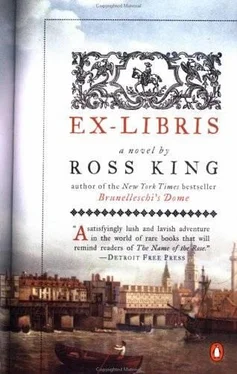Suddenly Lady Marchamont tapped one of the walls with her gloved knuckles. It reverberated like a kettledrum. 'Copper,' she explained. 'Cromwell's men stored their powder down here, so the walls and door were sheathed with copper. Not exactly the driest place in the house, I shouldn't have thought.'
'Gunpowder?'
At once I knew the identity of the acrid smell and the grit beneath my feet. I began to fret about the lamp, which Lady Marchamont was swinging to and fro with little regard. Its light now illuminated a number of sealed doors and smaller recesses on either side. I shuddered again in the cool dankness, wondering if behind these doors the skulls and shinbones of a hundred Plessingtons were heaped promiscuously together in crumbling ossuaries. We hurried along the corridor, whose terminus-if there was one-was lost in blackness.
At last we reached our destination. Lady Marchamont stopped before one of the doors and, after struggling with a set of keys, forced it open. A pair of rusted hinges creaked portentously.
'Please,' she said, turning to me with a smile, 'do step through, Mr. Inchbold. Inside you will find the mortal remains of Sir Ambrose Plessington.'
'Remains…?' I made to retreat, but it was too late for resistance. Lady Marchamont had my wrist and was tugging me across the threshold.
'There…'
She was pointing to a corner of the tiny room, where a battered oak coffin sat on a low trestle-table. I recoiled, trying to free my arm, but then saw to my relief that her father's 'remains' were textual, not corporeal; for the coffin, whose lid had been propped open, was filled not with bones but rather with piles of documents, great sheaves of which threatened to spill over.
'Everything is here.' Her tone was reverential as she picked her way carefully forward. 'Everything about my father. About Pontifex Hall. Rather, very nearly everything…'
She had hung the lamp on a wall sconce and now knelt before the coffin on a bed of rushes that had been strewn across the dirt before the trestle-table. The coffin, I now saw, was caked with dirt. She began withdrawing the documents one by one, riffling through and then replacing them. The mantle hung over her shoulders like a pair of folded wings. Some sort of archive, I supposed, hanging back in the doorway until she beckoned me forward.
'The estate papers,' she explained. 'The inventories, the indentures, the conveyances.' She might have been delving her gloved hands in a trunk filled with moonstones and amethysts instead of these heaps of yellowed documents. 'It was for these that Standfast Osborne purchased the estate, you see.' Her voice echoed harshly against the bare walls. 'For its muniments. He cared nothing for the house, as you can see all too plainly. But the coffin was hidden safely away. Lord Marchamont saw to that.'
The room was airless and cramped, its walls encrusted with what I took to be deposits of saltpetre. The flame, glowing feebly now, lit generations of cobwebs, all of them thick with dirt. I have been troubled all my life with asthma-the upshot of having my lungs kippered by the coal smoke of London. Now, standing in the doorway to this strange vault, I felt a familiar gurgle beneath my breastbone.
'They were kept here, in this room,' I managed to ask, leaning on my thorn-stick, 'for all those years?'
'Of course not.' Her winged back was still turned to me. 'They would have been found in an hour. No, they were buried in a plot in the churchyard at Crampton Magna. In this coffin. Ingenious, no? Beneath a headstone inscribed with the name of one of the footmen. Here…' She turned, extending a single sheet in her gloved hand. 'This is the order that sealed our fate.'
The paper was of heavy linen, its edges curling and faintly seared. I took it and, tipping it into the light of the lamp and bringing it to within two inches of my nose, saw the impression of a Parliamentary seal and, below, the inscription, slightly faded, in a thick chancery hand:
Be it therefore enacted, That all the Manors, Lands, Tenements and Hereditaments, with every of their Appurtenances whatsoever, of he the said Henry Greatorex, Baron Marchamont, were seized or possessed of, in Possession, Reversion or Remainder, on the 20 thday of May, in the year of our Lord 1651, and all rights of entry into the said Manors, Lands, Tenements or Hereditaments…
'The order for the seizure of the estate,' she explained. She handed me another paper, or, rather, a small sheaf. This gathering, tied with a faded and fraying ribbon, was less obviously official and inscribed in a formal secretary hand which, though I didn't know it at the time, was that of Sir Ambrose Plessington himself, who first appeared to me, therefore, between the lines of a lengthy text, a list of his accoutrements: ' An Inventorie taken of all the Cattelse and Chatteles moveable and unmoveable of Ambrose Plessington, Knt, of Pontifex Hall, in the Parish of St. Peter's, valued and prized in the presence of four Bailies… '
I set my stick aside and untied the ribbon. The remainder, six pages in all, inscribed on both sides, consisted of a formidably long list of Sir Ambrose's possessions, of his furniture, paintings, draperies, silver and plate, along with more esoteric items such as telescopes, quadrants, calipers, compasses and several cabinets whose contents-preserved animals, shells and corals, coins, arrowheads, fragments of urns, objets d'art of all kinds, and even two automata-had been enumerated individually. One of the most valuable of all was a ' Kunstschrank ' whose surface was inlaid with diamonds and emeralds, though what might have been inside this glittering ark-valued at an astonishing £10,000-the inventory declined to report. The entire contents of the house were valued on the last page at £155,000; an incredible sum that was enormous enough in 1660, and one that in June of 1622, the date of the inventory, must have been well and truly boggling. Not even the treasures of the late King Charles, that great connoisseur, had fetched so high a price when Cromwell stripped them from the royal palaces and then sold them to the ravening princes of Europe.
Lady Marchamont had caught my astonished gaze. 'Of all of these items,' she said in a quiet voice, 'you can see that almost nothing now remains. All were taken from us or were destroyed by the troops. Only this trunk and these papers bear witness to what Pontifex Hall used to be. To everything my father built.'
'But the library…' I had returned to the front of the list and was now scrolling slowly through it for a second time. 'I see no mention of your father's books.'
'No.' She took the paper from me and, after tying the ribbon, replaced it in the coffin. 'This particular inventory does not include the contents of the library. A separate one was compiled for that.' She turned round and, after further riffling, disinterred a larger sheaf. 'Extremely detailed, as you can see. It contains the price paid for every book, along with the bookseller or agent from whom each was purchased. An interesting record, but there's no time to study it now. For the moment…' She set it aside and delved carefully into the coffin, turning over heavy sediments of paper. 'For the moment, Mr. Inchbold, you must read something else. During his lifetime my father received letters patent in a number of countries, from several kings and emperors. But these ones may be of particular importance.'
Importance to what? What had my presence at Pontifex Hall to do with this foul subterranean vault and its scraps of old paper? With kings and emperors? Lady Marchamont had already turned round and handed me three or four documents. The first was a parchment and at its foot bore in cracked red wax the impression of an enormous seal whose circumference read, in characters that were barely perceptible,
Читать дальше












